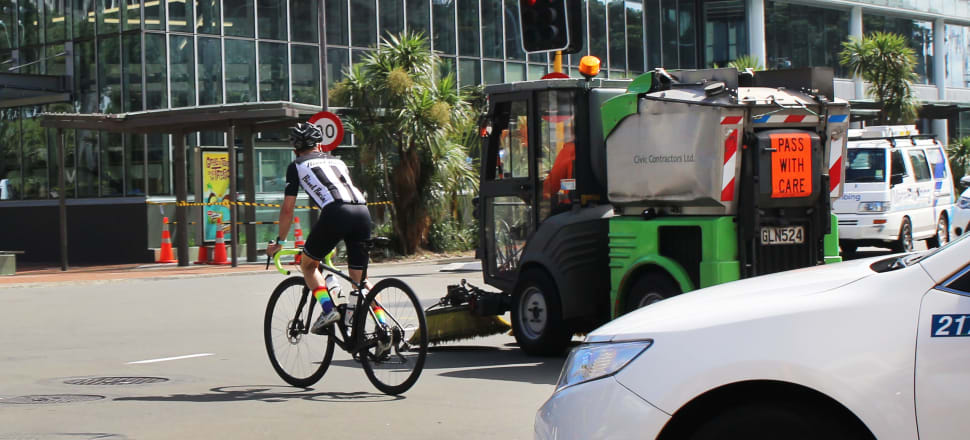
The three people vying for Wellington's top job each have different transport preferences and a different level of ambition around climate change, Marc Daalder reports
While Wellington's three main mayoral candidates don't disagree on all that much policy-wise, they each have drastically different visions for how people will move around the capital in the coming decades.
Andy Foster, the incumbent, has overseen a review of the $7.4 billion Let's Get Wellington Moving transport programme and winnowed down the options to a final choice which involves a new Mt Victoria tunnel, mass rapid transit to the city's south coast and significant housing intensification along the new corridor.
While the blueprint for Wellington's transport overhaul predated Foster's first term as mayor, he feels he hasn't got enough credit for the hard work he put into marshalling agreement from the council, the regional council and the Government on a lasting way forward. At a debate hosted by the Wellington Chamber of Commerce last week, he pledged spades would be in the ground before the end of the year.
His competitors, however, say that isn't good enough. Rongotai MP and former councillor Paul Eagle, endorsed by the Labour Party, seems less than dedicated to the entire project. Former chief of staff to the Green Party Tory Whanau, endorsed of course by the Greens, wants it to go further and faster.
Both suggested at the Chamber of Commerce debate that negotiations with Government should be reopened to get taxpayers to foot a greater portion of the bill than the 60 percent it is currently committed to.
"I will be, wherever possible, asking the Government to step in where possible. It's a hefty price tag, it has to happen but this is an investment in our city's future," Whanau said.
"I will talk to my friend Grant Robertson and say, look, this 60/40 split needs reviewing," Eagle agreed.
Foster rankled at that idea and said the council's portion of the price tag would have to be paid from rates and potentially congestion charging. Whanau thought it could be debt funded while Eagle said he would review and then cut council spending to find the cash.
Speaking to Newsroom after the debate, Whanau said she was surprised to hear Foster seemed more dedicated to seeing Let's Get Wellington Moving through than Eagle did.
"What I want to see is a leader saying we need to address transport right away. I've heard Paul say we need a plan. Let's Get Welly Moving is a plan. What it needs is a reduction in consultation times so that we can make it go faster. I worry that if Paul comes in, he's going to halt things, come up with a new plan and then we end up with more years of non-delivery," she said.
At the debate, Eagle hedged on the usefulness of the scheme.
"This would be bad for business. It gets promoted as something that's good but businesses have said to me that they're unsure because it focuses on the streetscape only. What about retail? What about hospitality? What about business who say they want to be part of the conversation?" he said.
Eagle wants to take that more collaborative approach to other transport issues as well. He isn't sure about the master cycling plan approved by the council this year, saying that individual neighbourhoods should have a greater say in their local networks.
"I want to bring in neighbourhood plans," he told Newsroom. "I want to line up transport with housing, with business and retail. What I'm clearly seeing - and I'm no clairvoyant on this - every time there's a cycleway, we go back to court. Every time we offend all sorts of people."
Foster also believes the pace of the cycleway rollout is getting ahead of social licence for street changes. He wants the network to be developed over two decades as originally recommended by council officials, not the one decade approved by the council.
"In trying to do it at that pace, we're clearly seeing what I call speed wobbles. It's a euphemism for some fairly challenging conversations with the community. We've seen a couple go to court already and I think if we spent a little more time talking through cycleways with affected communities, we are likely to get a good result."
Whanau says she's the most supportive of the cycle network, of the three candidates. She supports the current timeline for the rollout but also said it was important to listen to affected communities.
Both Whanau and Eagle said they would use new powers the Government is creating that would allow councils to convert streets to cycleways with less consultation. But they disagreed on what difficult decisions they would make to ensure Wellington meets its climate targets.
Whanau said she supported pedestrianising the city's Golden Mile, even though this was unpopular with businesses. She was open to building a parking building (not on the council dime) if there was demand for it.
Eagle said he would encourage schools and local businesses to embrace Car Free Fridays and find alternative ways of commuting, though this would be voluntary. He also thought tree planting could do a lot of the heavy lifting if needed.
Foster said climate policies had to be carefully reviewed for unintended consequences.
"One of the issues is that I think there are some people who want us to essentially save the world in Wellington," he said. "If you push a lot of people out of the city, not only do you damage the city but you also create higher carbon emissions because people will still travel by car but they'll choose to travel further. I just think we have to be very careful about how we do these things."







